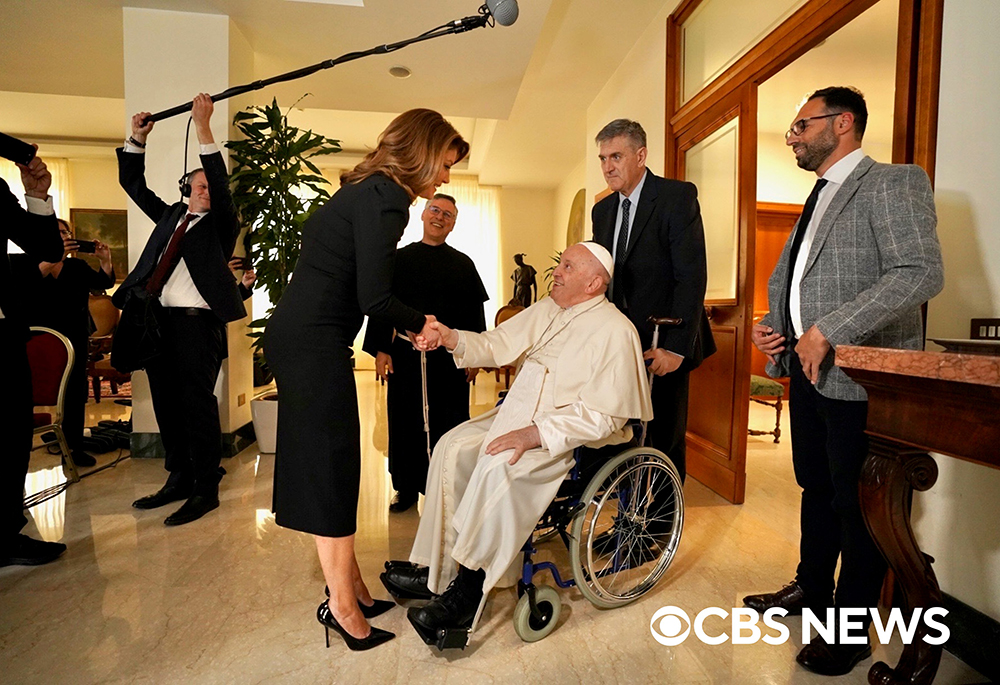
Pope Francis greets Norah O'Donnell before an exclusive interview with the "CBS Evening News" anchor April 24 at the Vatican, for an interview ahead of the Vatican's inaugural World Children's Day. (OSV News/Courtesy of CBS NEWS)
Climate change presents the world with "a road to death," Pope Francis said in an exclusive primetime interview with CBS News, during which he also affirmed that protecting the planet is a top priority for the world and chastised as "foolish people" those who deny the reality of global warming.
The comments were part of a wide-ranging interview with Francis conducted by Norah O'Donnell, anchor of "CBS Evening News." It was one of the most high-profile interviews with Francis to date by an American news outlet.
An hourlong primetime special aired May 20, after a portion was featured a day earlier on the television newsmagazine "60 Minutes." The journalist O'Donnell conducted the interview April 24 in the Vatican at Casa Santa Marta, where Francis resides.
The broadcast of the interview in the U.S. happened to align with the start of Laudato Si' Week, the annual Vatican-led celebration marking Francis' 2015 encyclical on ecology, "Laudato Si', on Care for Our Common Home."
On the topic of climate change, O'Donnell asked the pope how worried he was about the accelerating rise of global temperatures.
"Unfortunately, we've gotten to a point of no return. It's sad, but that's what it is," responded Francis, who spoke in Spanish and was translated by CBS News. "Global warming is a serious problem. Climate change at this moment is a road to death. A road to death, eh? And it is an artificial climate change, no? Something provoked, not the normal climate change, right?"
Since the Industrial Revolution of the late 19th century, average global temperatures have risen 1.1 to 1.2 degrees Celsius (roughly 2 degrees Fahrenheit), with the 10 hottest years on record all occurring in the past decade. While countries under the Paris Agreement have adopted policies to limit global warming, ideally to 1.5 C, current national laws, programs and pledges have the planet on a trajectory of passing that limit in the 2030s and reaching nearly 3 C of warming by the end of the century.
Francis lamented during the interview that international efforts to address climate change, including the United Nations annual climate summits, have not done more in raising rapid responses to rising temperatures.
"They hold a conference, everybody is in agreement, they all sign, and then bye bye. But we have to be very clear: Global warming is alarming," said Francis, who in December was set to become the first pope to attend a U.N. climate conference before illness forced him to cancel his trip to COP28 in Dubai, United Arab Emirates.
When O'Donnell commented he has placed blame for climate change on wealthy nations, the pope replied, "In great measure, yes, because they are the ones that have more of an economy and an energy based on fossil fuels that are creating the situation, right? They are the countries that can make the most difference given their industry and all, aren't they?"
Francis has repeatedly referred to the "ecological debt" that industrialized countries in the Global North have incurred from their disproportionate use of natural resources — often extracted from developing countries — that have contributed to climate change, deforestation and other environmental calamities. He has stated that industrialized countries have a responsibility to do more in addressing climate change, including by significantly reducing their use of fossil fuels and assisting poorer countries.
In Laudate Deum — an apostolic exhortation "on the climate crisis" issued in October as a follow-up to Laudato Si' — Francis singled out the carbon footprints of Americans, which he noted are more than seven times larger than individuals in the world's poorest countries, and suggested changes in Western lifestyles "would have a significant long-term impact."
In that same document, Francis chastised people, "even within the Catholic Church," who deny or minimize the signs and scientific evidence of climate change, devoting a sizable portion of the document to countering common misleading and false arguments.
Asked what he would say to climate deniers, the pope said, "There are foolish people. And even if you show them the statistics, still the fool will not believe. Why? Generally, it is either because they don't understand the situation or out of a vested interest."
"But climate change is real," he continued.
Advertisement
A December survey conducted by the Center for Applied Research in the Apostolate at Georgetown University found 66% of U.S. Catholics stating that church teaching on care for the environment was somewhat or very important to them — trailing only behind teachings on marriage and ahead of issues like immigration, abortion and the death penalty.
Likewise, two-thirds of U.S. Catholics surveyed affirmed the scientific consensus that global temperatures are rising primarily due to human activities that release heat-trapping greenhouse gas emissions.
But when asked about the most important issues facing the country, U.S. Catholics ranked addressing climate change and other environmental issues 14th out of 15 options.
O'Donnell at one point referenced Francis' frequent assessment, including within Laudate Deum, of climate change as one of the principal challenges facing the world today.
"Yes, because it is the future. It is life," the pope replied.
"Protecting the planet, how many young people today will not get to see so many things? It is a lack of conscience to use a plastic bottle and then throw it to the sea. This makes the sea unhealthy. We have to be conscientious about repurifying nature."








